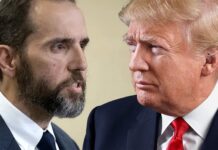Former acting Secretary of Defense Chris Miller went back on previous statements he made to the panel.
A former Trump secretary of defense revealed that he was pressured by the House Jan. 6 committee into staying silent about claims that then-President Donald Trump authorized the deployment of National Guard troops before the breach at the U.S. Capitol on Jan. 6, 2021.
Speaking to the Daily Mail on March 23, former acting Secretary of Defense Chris Miller, who was only on the job for about two months, said that members of the Democrat-led panel used “aggressive” tactics after he spoke to several media outlets about the Trump authorization. The final report from the Jan. 6 subcommittee, which was dissolved after the current Congress took over, claimed that President Trump did not authorize the deployment of the National Guard.
In 2022, Mr. Miller appeared on a Fox News segment along with former Trump national security official Kash Patel in an interview that he said “hit a nerve.”
“The two of us were on [the Fox News show] and the next day my lawyer got a call from the Jan. 6 staff director. … I forgot exactly who it was, but basically saying, very legalistic, ‘Well, if your client has additional information he wants to share, we’d be happy to have him re-interviewed,’” Mr. Miller told the Mail.
“It was more that latent threat of, ‘If you want to keep going on TV, we’re gonna drag you in here again for additional hours of hearing testimony.’ So that was the nature of that whole thing. It was the latent threat of the government continuing to intrude into my life.”
The former defense secretary added that he did not have the “resources to continue the battle” with the Jan. 6 committee and didn’t want to face any more depositions. Instead, he kept to himself and did not discuss how the panel allegedly targeted him.
“I didn’t talk about it with anybody else because of the fear or the concern,” he told the outlet. “I wasn’t communicating with anybody, because I knew any interactions I had on it would result in me having to … acknowledge that I’d been in communications with other people. And then that just sort of opens up a whole can of worms with the investigators that I just didn’t want to do.”





